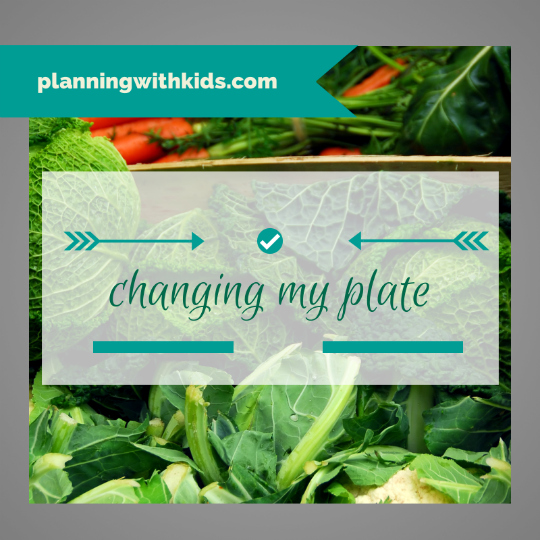This post is part of a regular series focusing on making small changes to improve our health. I shared my journey with changing my diet and moving to a clean eating approach which you can read here. I also had the lovely Katie Rainbird from Katie 180 undertake an analysis of my food intake for one day in that post, which was another step in the right direction.
Together we also offered the same opportunity to readers of Planning With Kids. We were blown away with the response and while I can’t guarantee will get to all of them this year, Katie has been busy working on many of the submissions already and we will publish as many as we can.
It is not possible for Katie to cover off everything in these posts. The aim is for her to find some small things you can change to what you are putting on your plate to help you achieve your current goal for your eating habits. You can read previous Changing my plate posts by clicking here.
Changing my plate – Theresa’s day
 Katie Rainbird (AKA Katie180) is a Sydney-based Nutritionist who is just as likely to be found jogging as she is baking. She is a mother to two, a keen home cook, prefers to get around in her workout gear and has a major passion for the written word. You can learn more at www.katie180.com.au.
Katie Rainbird (AKA Katie180) is a Sydney-based Nutritionist who is just as likely to be found jogging as she is baking. She is a mother to two, a keen home cook, prefers to get around in her workout gear and has a major passion for the written word. You can learn more at www.katie180.com.au.
Katie reviewed what a reader Theresa (not real name as wanted to stay anonymous) submitted that she ate in a 24 hour period. This is what Katie had to say about her day:
What is your current goal with your eating habits?
Better fuelling for half Marathon training. More energy, less sluggishness. Healthier options that are filling.
Increase protein and iron intake (don’t eat a lot of meat or fish, only chicken and beef).
Iron: dark green leafy things: spinach, kale, watercress, broccoli and the brassica family, prunes, dates, dried apricots, dried figs, seeds, nuts, red meat, dark meat on poultry. Protein: nuts, seeds, whole fat dairy, meat, eggs, whole grains and their products, tofu, tempeh, beans, legumes.
Breakfast
7am. At home. Pre-long run – honey and banana sandwich. Non-run day, weeties and all- bran with Chobani yoghurt and berries or half banana. Skinny milk coffee. Vital greens and water.
Put some nut butter onto that sandwich for protein. Nix the cereal, switch to whole rolled oats or a raw, organic muesli such as Pureharvest or Abundant Earth (or make your own!) add SEEDS to this as you NEED protein. Switch to full cream milk.
Lunch
2 egg omelette with tomato, spinach, cheese and mushroom. Home.
Fine. Add a big handful of leafy greens on the side though!
Dinner
5:30-6pm- home. Spaghetti bolognaise, with grated carrot, zucchini and corn. Spinach fettuccine.
Fine
Snack 1
Post-workout – protein powder smoothie with cacao, frozen berries, Ginger, Greek yoghurt, coconut water and half banana.
Otherwise, coffee and an apple.
Ok I’m going to rock the boat a little (maybe a lot!) and just say that I don’t like protein powders, generally they are highly processed and full of things to keep them from spoiling and to make them taste nice: even the healthy brown rice varieties. You could make your own brown rice protein powder by toasting brown rice over dry heat until it begins to smell like it’s toasting (not burning!) then removing from heat, allowing to cool and blitzing into a powder in a blender or food processor. Then use a scoop of this with an egg and blend with your cacao, berries etc as per usual. It’s REAL food.
Snack 2
3pm. Handful cashews, cup of white tea.
Fine
Snack 3
8pm – munchies. On occasion, chips, chocolate. (Wheels fall off)
Stock your pantry with healthier munchie options: nuts, dates, dark chocolate, pop corn, rice cakes, nut butters, home made bliss balls/energy balls whatever you like to call them. Make a hot chocolate on nut milk with cocoa and sweeten to taste with honey, maple syrup etc. Make a big one so it fills you up, have it with a couple of dates, chew slowly and this should provide the sweet hit and satiety you need before bed.
Snack 4
None
Dessert
Rarely have dessert unless dining out.
Nutritional supplements
Vital greens – 2teaspoons
Magnesium plus – 530mg x 1
When I remember:-
Ferro-grad C x1
Red krill oil 500mgx1
Probiomax x1
Line your supplements up in a row near your makeup or next to the kettle so that you see them in the morning before leaving the house. OR buy some of those little salad dressing tubs by Decor and sort them into doses each Sunday night so that you can just pop one into your handbag and take them when you get in the car or arrive at work or wherever it is that you are going. If you are low in iron then you must be diligent with your supplementation.
Daily fluid intake
2 litres water/day
1-2 wines per week
2 skinny milk lattes per day
1-2 cups white tea per day
Water is great. With your physical activity levels you can relax about drinking “skinny milk” and switch to a full cream variety, preferably organic. Perhaps reduce to one coffee however.
Any further information you’d like to share or special dietary requirements to factor in?
Have had recent trouble with irritable bowel and bloating.
Are you diagnosed with IBS or do you describe digestive upset as IBS? Bloating is a symptom that can arise from any number of underlying conditions, including a lack of protein in the diet. When you consider that we are made of protein, and as such require it to meet our needs for growth, development and repair… then a “leaky” gut (or small intestine with lack of integrity) can arise as a result of not being strong enough. This is ONE possible cause but with your level of physical activity and your lower protein intake it may be something that is relieved with a keener attention to protein in the diet.
Katie’s Summary
I see your diet as quite “healthy” but just missing nutrient boosts, particularly as you are so active. I think just focus on including protein at each meal even if it’s a small portion such as nut butter on toast or an egg in the smoothie, it all adds up. It doesn’t have to be meat, meat, meat and big serves of it too! Take your iron supplement. Try to reduce one coffee per day.
Further reading and recipes
- Blueberry muffins with carrot and coconut cream
- I drink A2 milk, here’s why.
- Protein Content of Foods List
- Choc avocado protein smoothie (non protein powder, PWK)
Disclaimer
Katie is a qualified nutritionist (Adv. Dip. Nutr. Med.).
Any diet or lifestyle changes that you implement as a result of reading this blog are your own responsibility.
This blog does not provide medical advice, any particular health conditions must be managed by your own health professional.
The content of this blog is not intended to be a substitute for professional medical advice, diagnosis or treatment.
Always seek the advice of your physician or other qualified health provider with any questions you may have regarding a medical condition. Never disregard professional medical advice or delay in seeking it because of something you have read on this blog.

